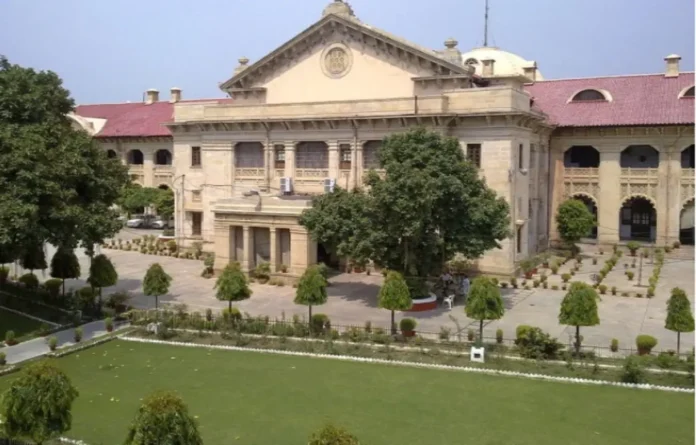The Allahabad High Court has said that if the lawyer assessed that there was no chance of success of the entire appeal and he decided to restrict his prayer for waiver of the penalty, it cannot be said that he acted absolutely without any authority.
A single-judge bench of Justice Subhash Vidyarthi passed this order while hearing a petition filed by the Ascent Education Trust, Kanpur Through Chairman Gurusharan Singh.
By means of the petition filed under Article 226 of the Constitution of India, the petitioner has challenged the validity of an order dated 12.12.2022 passed by the Collector, Unnao, holding that the petitioner has paid a deficient stamp-duty on a sale-deed dated 17.07.2017 executed in its favour and ordering recovery of a sum of Rs 15,24,220 towards deficient stamp-duty and an equal amount as penalty.
The petitioner has also challenged the validity of an order dated 09.05.2024 passed by the Commissioner, Lucknow Division, Lucknow, dismissing the petitioner’s appeal under Section 56 (1-A) of the Indian Stamp Act filed against the aforesaid order passed by the Collector.
The Standing Counsel has raised a preliminary objection that in the order dated 09.05.2024 passed by the Commissioner Lucknow Division, Lucknow, it is recorded that it was stated on behalf of the petitioner-appellant that the penalty of Rs 15,24,220 imposed by the Collector, Unnao be waived and the appellant was ready to deposit the amount of deficient stamp duty i.e Rs 15,24,220.
When the order was passed accepting the offer made on behalf of the petitioner itself, it is not open for the petitioner to turn around and challenge the validity of the order.
The Standing Counsel has also relied upon a decision in the case of Sree Surya Developers & Promoters v N Sailesh Prasad: (2022) 5 SCC 736, wherein the Supreme Court referred to some precedents and held that the only remedy available to a party to a consent decree to avoid such consent decree, is to approach the court which recorded the compromise and made a decree in terms of it, and establish that there was no compromise. In that event, the court which recorded the compromise will itself consider and decide the question as to whether there was a valid compromise or not. A party to a consent decree based on a compromise to challenge the compromise decree on the ground that the decree was not lawful i.e. it was void or voidable has to approach the same court, which recorded the compromise and a separate suit challenging the consent decree has been held to be not maintainable.
Counsel for the petitioner has submitted that in the case, neither was an agreement of compromise signed between the parties, nor has any decree been passed on the basis of any compromise. Therefore, the decision in the case of Sree Surya Developers and Promoters (Supra) will not apply to the facts of the case.
The Counsel for the petitioner has submitted that the petitioner has not given in writing that it was foregoing the challenge to the imposition of additional stamp-duty.
The Counsel for the petitioner has submitted that the petitioner had not instructed its Counsel to forgo the challenge to imposition of additional stamp duty and it is not bound by the concession given by the Counsel.
The Court observed that,
So far the petitioner’s contention is based on the judgment in the case of Himalayan Coop. Group Housing Society (Supra) is concerned, in the aforesaid case it has been held that generally, admissions of fact made by a counsel are binding upon the client as long as they are unequivocal but the client or the court is not bound by the lawyer’s statements or admissions as to matters of law or legal conclusions.
The admission in the case was not regarding a matter of law or legal conclusions. The Supreme Court has held that in some cases, lawyers can make decisions without consulting the client, while in others, the decision is reserved for the client. The lawyer can make decisions as to tactics without consulting the client, while the client has a right to make decisions that can affect his rights.
Therefore, if the lawyer assessed that there was no chance of success of the entire appeal and he decided to restrict his prayer for waiver of the penalty, it cannot be said that he acted absolutely without any authority and that might be the reason as to why the petitioner did not initiate any proceedings against his Advocate who had given the concession.
“In view of the aforesaid discussion, I am of the considered view that the petitioner cannot be permitted to dispute before this Court the correctness of the happenings recorded by the appellant authority i.e Commissioner Lucknow Division, Lucknow in the order 09.05.2024 to the effect it had been submitted by the counsel for the petitioner that the petitioner was willing to pay the deficient amount of stamp duty and he was confining his prayer for waiver of the penalty,” the Court further observed while disposing the petition.
“However, it will be open for the petitioner to move an appropriate application before the Commissioner Lucknow Division, Lucknow for disputing the correctness of the averments recorded in the impugned order and in case any such application is filed by the petitioner, the Commissioner, Lucknow Division, Lucknow shall decide the same expeditiously, without granting any unnecessary adjournment to any of the parties,” the order reads.


